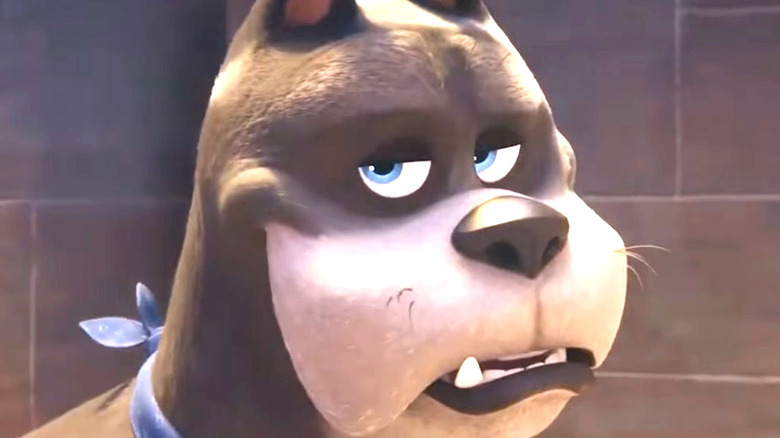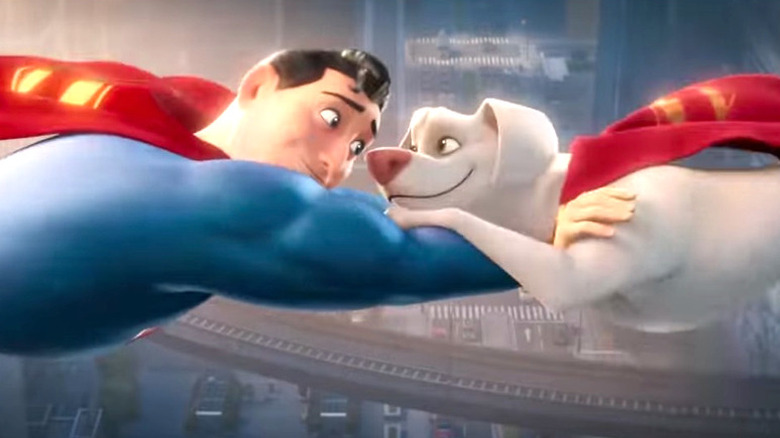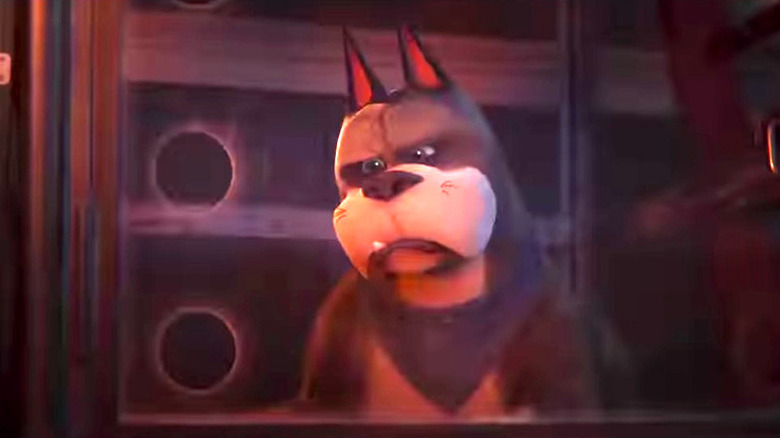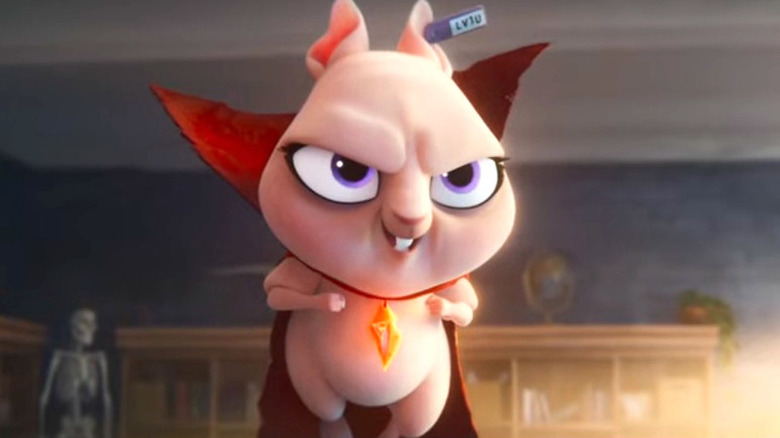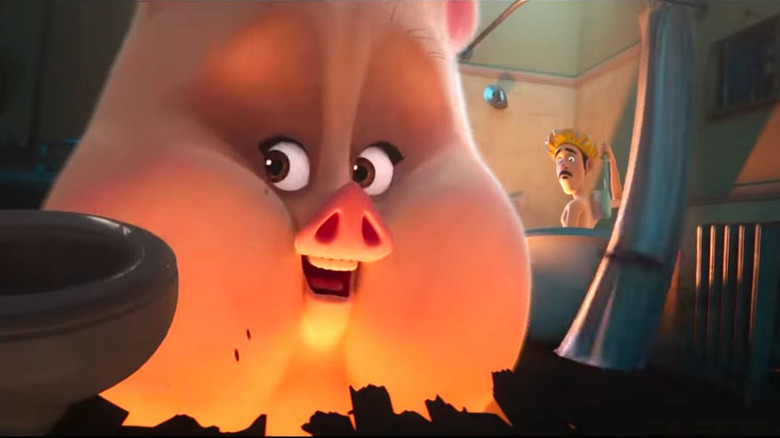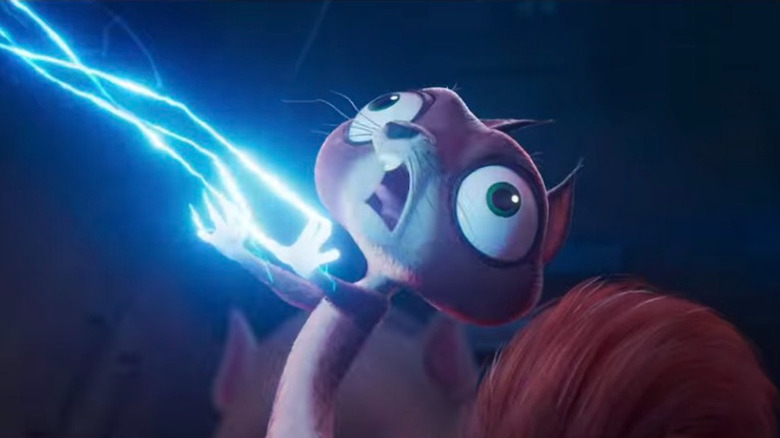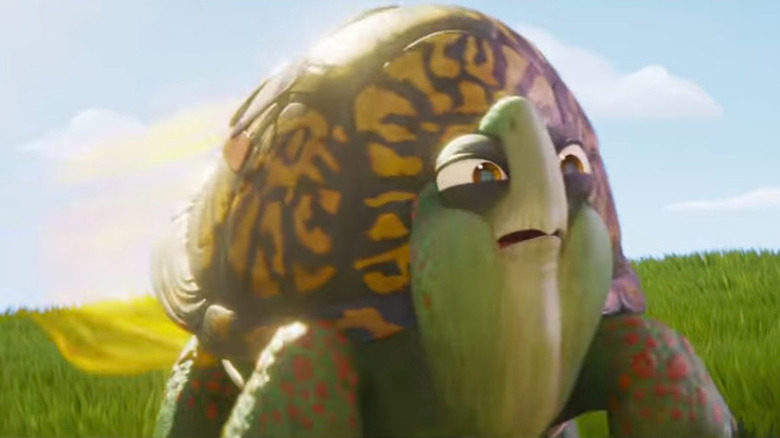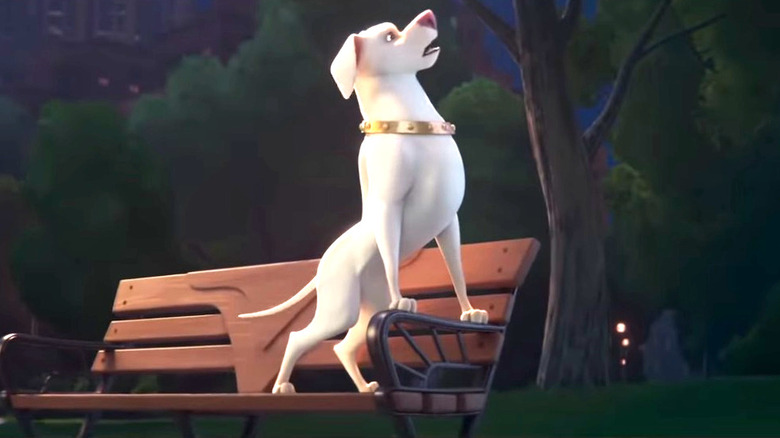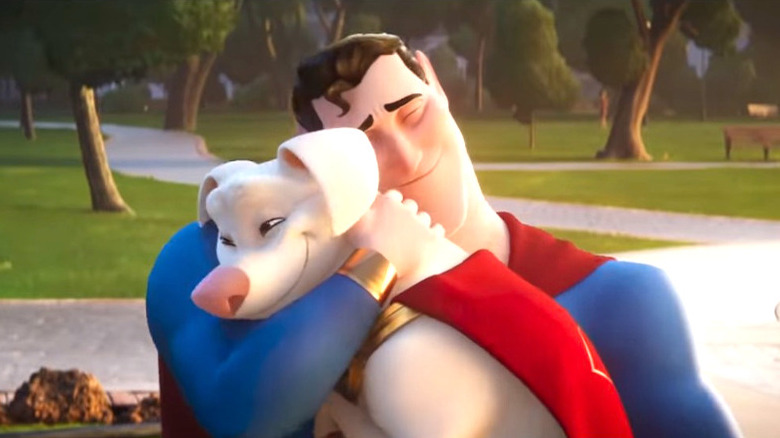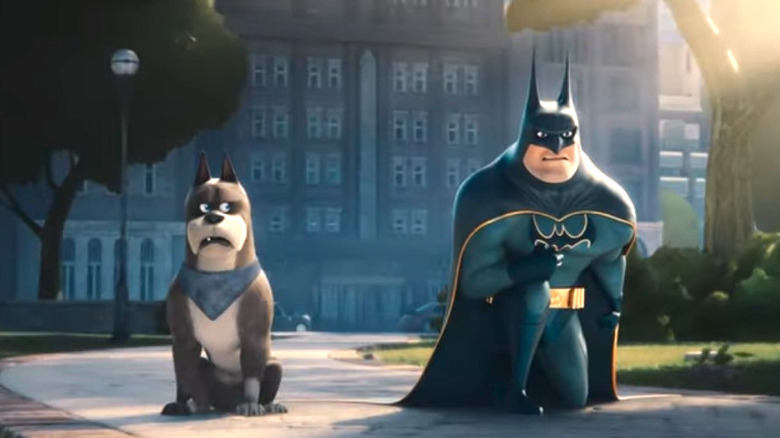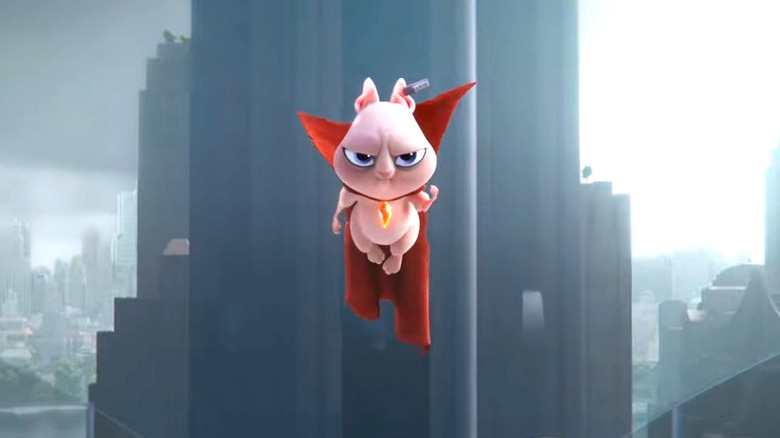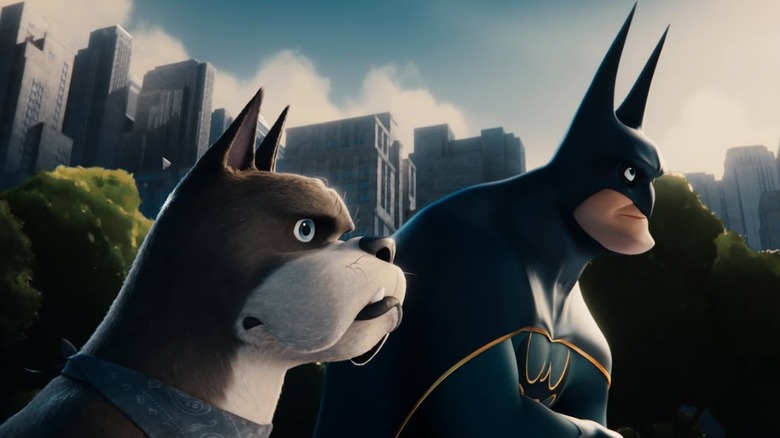The Ending Of DC League Of Super-Pets Explained
"DC League of Super-Pets" is an animated adventure film starring the voice talents of Dwayne Johnson and Kevin Hart (among a slew of others) that gives classic superhero action to some animals for a change. A touching story about a maniacal guinea pig bent on world domination facing off against Superman's pal Krypto the Superdog and a band of shelter animals who prove to the world that they're far more than just rejects, "DC League of Super-Pets" explores the nature of heroism and the importance of unconditional love in all of our lives.
On the surface, the film appears to be your standard hero's journey, following the classic template with precision. When considering the narrative as a whole, however, a simpler yet deeper truth quickly emerges. Yes, the story is essentially good guys vs. bad guys, but the specifics of that conflict, the arcs of the main characters, and the themes addressed along the way paint a far more engaging and meaningful picture.
We're going to break down the major elements of the film to help make that picture crystal clear. From the characters and plot details to themes that might have gone right over your head while you were laughing (or crying), we're delving deep into what makes the movie so rewarding, and what sets it apart from your typical superhero fare.
A dog and his boy
It's probably fair to say that most of the audience already knows Superman's origin: when the planet of Krypton was destroyed, a single child was sent to Earth and became Superman. Well, "Super-Pets" tells us there was another survivor: Krypto the Superdog.
It's clear from the very first scene that the movie focuses on the unconditional love of a dog. He can't bear to be without his boy Kal-El, so he forces his way into the escape pod. As the ship travels through the cosmos, little Kal-El cries, afraid of the journey ahead, but Krypto is there to keep him safe. We see that their life in Metropolis is pretty great — Supes and Krypto fly through the gleaming art deco city saving lives and just being the very best of pals. Things only start to go downhill once Lois Lane enters the picture.
Krypto has a hard time accepting the fact that Superman (voiced by John Krasinski in his second superhero role of 2022) needs a private life of his own. His arc in the film is one of acceptance. Only after learning how to survive without his powers, and without his best bud, can he grow and become a true hero — one who listens to others and relies not just on his incredible abilities but also on the abilities and insights of his friends to keep the world safe.
Ace in the slammer
Prior to watching "DC League of Super-Pets," you might've imagined that Ace the Bat-Hound would be the loner — a closed-off, brooding, dark avenger. To a certain extent, you'd be absolutely right. He's a hero with a tragic backstory, serving time in a rescue shelter for a crime he didn't commit. That allows him a certain degree of self-pity, but he's actually the heart of the film (and yes, Kevin Hart provides his voice, but it's not a pun).
The reason Ace lives in a cage is that he saved a little girl's life. As a puppy, he lived with a family he deeply loved. That family had a toddler who wandered off on her own one day. Ace found her standing on the edge of the stairs about to topple to the bottom. Acting purely on instinct, Ace grabbed her arm with her mouth and pulled her away. Proud of rescuing the girl, he looked up with confusion as her parents regarded him with suspicion. His teeth had drawn blood.
He was sent to the shelter, where he now lives out his days in a box, seemingly never to be adopted. He tells Krypto he wouldn't change a thing because that's what dogs do: love unconditionally. He understands the parents were just protecting their baby. Although he's tortured by the memory, he doesn't let it get in the way of helping others. This is what makes him such a perfect match for Batman.
Lulu loves Lex
If Krypto and Ace represent pets that love the humans for all the right reasons, Lulu represents the dark side of that. Voiced by Kate McKinnon (in a role she was born to play), Lulu was a test subject abused by the evil billionaire Lex Luthor. He tested a variety of Kryptonite shards on her, resulting in all of her fur falling out as she gained increased intelligence. However, she doesn't see Lex as her abuser — to her, Luthor is her best friend and she'd be willing to do anything to return to him.
Knowing how much he despises the Justice League (and goodness in general), Lulu snags a chuck of orange kryptonite originally lassoed by Luthor to give himself powers and becomes the villain of the film. The crystal gives her the ability to fly and control objects with her mind, which she uses to capture the Justice League and recruit a band of fellow guinea pigs to rescue Luthor from Stryker's Island (Metropolis' futuristic version of Alcatraz).
When she arrives to spring Lex, he appears impressed. All of her dreams are coming true. Then, he traps her in a cell and walks off to take all the credit for her hard work. This is the moment she realizes the truth: Lex Luthor never loved her. The only person he loves is himself. Fueled by rage, Lulu shatters the kryptonite, allowing it to enter her brain and turn her into a gigantic, super-powered kaiju.
PB needs to love herself
PB is a lovable pig voiced by "Saturday Night Live" alum Vanessa Bayer. She operates as something of an audience surrogate, being a fan of all the DC heroes in much the way a comic reader would be. Sure, Wonder Woman is her absolute favorite, but PB doesn't discriminate. She thinks everyone is great and has what it takes to make the world a better place ... except herself.
When a shard of orange kryptonite lands in the pet shelter (courtesy of a device created by Lulu), it sends out a shockwave that gives everyone powers. PB is awarded the ability to shrink or grow to extreme sizes. The thing is, though, she can't quite seem to figure it out. Sometimes she grows into an enormous pig when she means to shrink, and vice versa. As Ace points out, PB needs confidence that will only come when she learns to love herself as much as she does everyone else.
Once she does realize that she actually deserves these powers and can be just as heroic and important as the Justice League, she is finally able to control her powers. When Lulu activates Luthor's rocket that will send the Justice League into space, PB is able to grow to the size of a skyscraper and launch Chip and Ace into the sky. They literally couldn't have done this without her. In the end, she has a home and some newfound confidence, but she still can't figure out her superhero name.
Chip needs to feel safe
Living in the animal rescue shelter with the rest of the gang is a squirrel named Chip (Diego Luna). He's a nervous little guy who, like PB, has zero confidence in himself. Actually, he doesn't have confidence in most things. He's always jittery, worried about what catastrophe will befall him next. Even when everyone else gets powers, he assumes he was left out because his didn't manifest right away. Once lightning bolts erupt from his hands, he's both elated and embarrassed.
He can't control his powers. He tries, but usually ends up doing more damage than help. He doesn't think he can be a hero like the rest because nothing good ever happens to him. Like everyone else, he watches with envy as other pets (usually kittens) get adopted and he's ignored. Because of this, he's certain that he doesn't matter and is doomed to go through the rest of his life as a failure.
However, Krypto helps convince Chip he's safe. He has friends who care about him and are willing to look after him. Thanks to this, he helps trap the adorable evil kitten assassin sent by Lulu to destroy them. That's the first time they all work as a team, and Chip is an invaluable part of that. Likewise, he's the one who cuts through the rocket carrying the Justice League. For his heroism, he's rewarded with a home and a Green Lantern ring.
A bat out of shell
As J.R.R. Tolkein taught us, not all who wander are lost. In the case of Merton the turtle (a hilarious vocal performance from Natasha Lyonne), this is 100% true. Well, she does get lost a few times, but that's just because her eyesight is awful. It happens when you get old, and as Merton reveals, she's been around for a very long time. For the most part, though, she couldn't be happier just cruising through life.
Of all the pets in the shelter, Merton is the one with the least to worry about. She doesn't really have a major epiphany (other than the fact that the rest of the pets aren't also turtles). She just kind of goes with the flow. Given super speed by the orange Kryptonite, Merton also struggles with her powers, but once Krypto pops a pair of comically large glasses on her eyes, that's no longer a problem.
One could argue that Merton is unnecessary comic relief in an already funny movie. She's often used as something the film can cut away to for a funny observation or silly character moment. However, she also comes to represent the idea that just because an animal lives in a rescue shelter doesn't mean something's wrong with them. Maybe she could do with a little less flirting with inanimate objects, but Merton is a mostly well-adjusted character ... kind of like The Flash.
Powers don't make the hero
Krypto obviously cares about saving people, but he's a little too reliant on superpowers to get the job done. Like Supes, Krypto can talk to his Kryptonian father Dog-El (voiced by the always awesome Keith David) via a series of pre-recorded messages. His father advises that powers don't make someone a superhero, and Krypto is confused by this. Only after ingesting that kryptonite and losing his powers for a few days does he understand.
He's gone through life being invulnerable and capable of the most incredible things thanks to his alien biology. This means he's never really had to listen to people before. He just swoops in, rescues someone, and heads home in time to watch "The Great British Bake-Off" with Superman. Once he can no longer do that, he's forced to listen to others and learn what they need emotionally in order to be their best selves.
The animals in the shelter aren't heroes because they can run super fast or shoot lightning out of their hands. They were already heroes because of their bravery in the face of uncertainty. Their lives are confined to cages, watching all those darn adorable kittens get adopted. Still, when given the chance, they choose to help others. That's why, when Krypto is given the chance to sacrifice himself to stop Lulu and save the world (and his friends) he does — because powers don't make someone a superhero. Their heart does.
The Farm is here
Life in the rescue shelter without someone to love is so bleak for the pets that Ace makes up a story to give them something to hope for. He tells them about a magical farm upstate where all their wildest dreams can come true. While living in cages, it makes perfect sense for them to sit back and fantasize about what wonders wait for them upstate, but once they're free things get a bit trickier. Ace tries to explain that the farm was a metaphor, but never gets the chance to.
Thankfully, Krypto grew up on a farm in Smallville, and he thinks that was a pretty special place. He promises the pets that when the Justice League is saved and Lulu is stopped, he will take them there and they can all be happy. Once the dust settles, the villains are punished, and the day is won, Krypto is ready to deliver on his promise. To his surprise, however, he doesn't need to.
If this experience has taught the Justice League anything, it's that they all need pets in their lives. They decide to adopt the animals who saved them. Krypto looks around and sees that all of his new friends have someone to look after them, and who they can look after in return. There's no need to go to the farm because they already have everything they could have wanted.
Ace helps Batman relax
Batman is a malleable character who can be interpreted in many different ways. Throughout various interpretations, he's been the light-hearted rich guy in a bat costume looking out for the citizens of Gotham as often as he's been the dangerous, single-minded warrior of justice. Several movies have leaned into more violent and brooding takes on the character, and "DC League of Super-Pets" has a lot of fun with that.
Keanu Reeves voices a Batman who is constantly on the verge of losing it (just imagine what would've happened if Krypto's Batman chew toy wasn't licensed). Either he's going to weep or just knock a bunch of random baddies out cold. At one point during the film, while he's locked up with the rest of the Justice League, he monologues about being surrounded by bats as a boy and how he can still feel them to this day. Superman then points out that a pet would do him good.
At the end of the film, Batman meets Ace, a fellow hero with a tragic past. They bond over their trauma, though they're reluctant to acknowledge how much they need each other. Ace finally throws caution to the wind and leaps on Bats, covering him with dog kisses and making the Dark Knight smile for the first time in the movie.
Mercy For Lulu
Lulu is the movie's villain, but you can't help feeling sorry for her. She's done some pretty terrible things, for sure — not only did she almost kill the Justice League and wreak havoc all across Metropolis, but she gave unwanted powers to a bunch of guinea pigs who wanted nothing more than to hang out with endless supplies of food and water. This is all undeniably villainous, but it isn't really her fault.
There are two women in Lex Luthor's life, and he treats them both terribly. One, obviously, is Lulu, though she barely registers as a living creature in his mind. The other is his assistant Mercy. She doesn't do a lot in the film, but her relationship with Luthor is pretty important. She sticks to the sidelines, observing and commenting. When Lex gloats about his victory against the Justice League, she's the one who points out that Lulu did all the work.
When Lulu gets hit by Krypto's solar paw punch and loses all of her abilities, it's a fitting punishment that she's locked away in a hot dog cart. Still, there's a sense of joy at seeing the cart open as Mercy reaches in to retrieve the hairless guinea pig — even Lulu gets home and someone to look after her.
Real heroes adopt
It really should've been obvious the entire time. When looking back at the movie, it was always there. Thankfully, though, "DC League of Super-Pets" goes ahead and explicitly states what the movie is really about during the end credits. As the music plays, we see a lot of the pet shelter. Specifically, a chalkboard in the pet shelter that reads, "Real heroes adopt."
That's what the movie's been trying to tell us the whole time. Look at Bruce Wayne — he's got all the money in the world. He could buy the purest of purebreds, but he doesn't. None of the Justice League do. They all take in rescue animals because they have so much love to give. The movie shows us that just because an animal may have a troubled past, or may have a little trouble adjusting, that doesn't mean they don't deserve a home.
Perhaps it's a little grandiose to suggest that "DC League of Super-Pets" was one giant, entertaining PSA about the importance of adopting pets, but is that so wrong? With all the animals out there in need of a family, is it really a bad thing to suggest that maybe a movie can do more than just make a bunch of money? Whether it was the primary motivation of the filmmakers or not, the message is there, and it matters.
